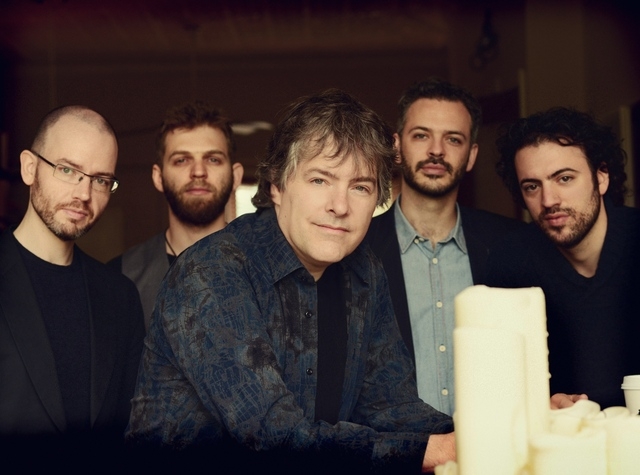Bela Fleck keeps searching for something different
Three concerts in three years.
In 2012, just as The Smith Center opened its doors, Grammy-winning banjo master Bela Fleck led the Flecktones into Reynolds Hall for jazz-meets-bluegrass fusion. A year later, he was back, sharing the stage with jazz keyboard legend Chick Corea for more musical cross-pollination.
And on Saturday, Fleck returns again to Reynolds Hall, this time with the classical string quartet Brooklyn Rider, for a program featuring yet another side of his protean talents.
Ask Fleck what keeps him coming back to The Smith Center and he has a ready answer: “It’s the backstage food.”
But seriously, folks, it’s the chance to do what he always does: something different.
In this case, it’s the chance to explore the banjo in another unexpected context, this time centering on classical music.
It all started when the Nashville Symphony commissioned Fleck to write a classical piece for banjo and string quartet. You can hear it on Fleck’s 2013 recording, “The Impostor.”
But he needed something else to fill out the album.
That something became “Night Flight Over Water,” a 25-minute, three-part work for banjo and string quartet, which Fleck and Brooklyn Rider will perform Saturday, intertwining lyrical melodies, adventurous harmonies and percussive instrumental approaches — Brooklyn Rider going pizzicato with their violins, viola and cello as Fleck chimes in on twangy banjo.
Because “we needed more music for a whole night,” however, Fleck wrote a second piece for himself and Brooklyn Rider: an untitled 18-minute work he just might call “18 Minutes,” he jokes.
Also on the program: new arrangements of some Flecktones tunes, some bluegrass tunes, along with “some of Brooklyn Rider’s material they’ve written or arranged,” Fleck says during a telephone interview.
And there’s plenty to choose from, he adds, describing Brooklyn Rider as “one of the coolest string quartets out there.”
(Cellist Yo-Yo Ma must think so, too; Brooklyn Rider violinists Johnny Gandelsman and Colin Jacobsen, violist Nicholas Cords and cellist Eric Jacobsen are long-standing members of Ma’s acclaimed Silk Road Ensemble.
They’re also affiliated with the New York-based chamber orchestra The Knights, Fleck says, which gives them experience performing “a lot of new music from a lot of new composers.”
That’s partly why the Brooklyn Rider members were “the right people” for this particular project, he adds.
After all, it’s helpful for a composer to have collaborators who are used to “having direct communication with composers,” as opposed to “people who only play music from dead composers,” Fleck reasons. (Not that he’s got anything against dead composers — not with a name such as Bela Anton Leos Fleck, which honors not only Hungarian composer Bela Bartok but Austrian composer Anton Webern and Czech composer Leos Janacek.)
It’s just that being able to exchange musical ideas and opinions — or query the composer — adds to the collaborative atmosphere, in Fleck’s view.
“Bach would have loved it, Mozart would have loved it,” he says. And Fleck clearly loves it, reveling in the chance to compose classical music — note by note by note.
“If I’m writing a banjo tune, or certain kinds of tunes for the Flecktones, I don’t write all of it,” he says, describing how he’ll write a musical “sketch” that “gives everyone a lot of freedom.” (The same held true for his concerts with Corea.)
By contrast, “any classical” composition requires that “you write out every single note,” Fleck adds. “You have to think about the dynamics. It’s not partial composing and then ‘Everyone improvise!’ You’re forced to complete your musical thoughts.”
In coming up with those musical thoughts, Fleck says he “had to keep nerving myself up to this” by assuring himself, “ ‘You can do this.’ ”
Because “I don’t read and write music,” at least in standard notation, Fleck turned to his computer to translate his banjo notation into standard musical notation, enabling him to hear how intertwined musical passages sounded together.
“The computer saved my life,” he admits. “I can (compose) it all on the banjo, but I can’t play five parts at once.”
Fleck was composing his classical pieces while maintaining “a full touring schedule,” but the computer made it possible for him to write “on planes, on buses, while I had a day off” — and even on tour, when he would “find some time off and hide out,” taking his computer to a coffee shop or restaurant to write.
“The truth is, because I was able to take my time and write these pieces, I could think of interesting notes to put on the page,” Fleck says.
And although everyone who’s ever heard Fleck play would testify to his improvisational prowess, “even a really great improviser can only play what he can play off the top of his head,” he says. “With these pieces, I was able to come up with” notes and harmonies “I had never come up with before.”
For Fleck, “it was fun to see what you could come up with that you would never have time to figure out on the fly,” he says.
As a result, Smith Center audiences will see Fleck onstage with “10 pages of music, and I flip the pages,” the same way the members of Brooklyn Rider do, because “if I don’t stare at” the music, “I’m not going to play the right notes.”
And although “I’m embarrassed I didn’t have it memorized — because I wrote it,” he acknowledges, Fleck had better get used to it, given his plans to devote himself to creating more classical works for banjo.
The Brooklyn Rider collaboration is just the beginning, he promises.
“Your imagination is the only limitation,” Fleck concludes. “If you can imagine it, they can play it. The true challenge is to come up with something worth playing.”
Contact reporter Carol Cling at ccling@reviewjournal.com or 702-383-0272.





























